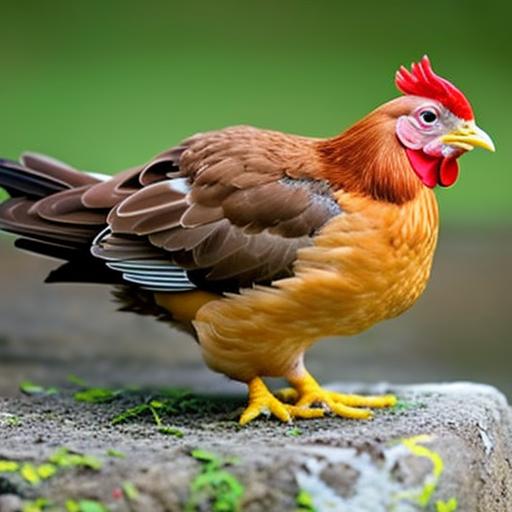Urban chicken keeping has become a popular trend in many cities across the United States, and Olympia is no exception. More and more residents are choosing to raise chickens in their backyard, enjoying the benefits of fresh eggs, a connection to nature, and the satisfaction of self-sufficiency. The trend has gained momentum in Olympia due to the city’s progressive attitude towards sustainable living and its commitment to promoting local food production.
Olympia is known for its vibrant community of environmentally conscious individuals who are passionate about sustainable living. The city has embraced urban agriculture as a way to reduce its carbon footprint and promote self-sufficiency. Urban chicken keeping is seen as a natural extension of this movement, allowing residents to produce their own food in a small-scale, sustainable manner.
Key Takeaways
- Urban chicken keeping is becoming increasingly popular in Olympia.
- City regulations allow for up to six chickens per household in residential areas.
- Raising chickens in an urban setting can provide fresh eggs, natural pest control, and fertilizer for gardens.
- Certain breeds, such as bantams, are better suited for smaller urban spaces.
- Urban chickens require a secure coop and at least four square feet of outdoor space per bird.
City regulations for keeping chickens in Olympia
While urban chicken keeping is encouraged in Olympia, there are regulations in place to ensure the well-being of both the chickens and the community. Residents who wish to keep chickens must obtain a permit from the city. The permit process involves filling out an application, paying a fee, and meeting certain requirements, such as providing adequate housing and space for the chickens.
To stay within the regulations, it is important to familiarize yourself with the city’s guidelines for keeping chickens. These guidelines include restrictions on the number of chickens allowed per household, minimum space requirements for coops and runs, and rules regarding noise and odor control. By following these regulations, you can ensure that your chickens are well cared for and that your neighbors are not negatively impacted by your hobby.
Benefits of raising chickens in an urban setting
There are numerous benefits to raising chickens in an urban environment. One of the main benefits is the access to fresh eggs. Chickens raised in a backyard setting produce eggs that are not only delicious but also free from hormones and antibiotics. This can be a major selling point for those who are concerned about the quality of the food they consume.
In addition to providing fresh eggs, urban chickens also offer environmental benefits. They help reduce food waste by eating kitchen scraps and turning them into nutrient-rich compost. Chickens also eat insects and pests, reducing the need for chemical pesticides in the garden. Furthermore, their manure can be used as fertilizer, enriching the soil and promoting healthy plant growth.
Raising chickens in an urban setting can also have health benefits. Caring for chickens requires physical activity, which can help improve fitness levels and reduce stress. Additionally, spending time outdoors and connecting with nature has been shown to have a positive impact on mental health. The act of caring for animals can also teach children responsibility and empathy.
Choosing the right breed of chicken for an urban environment
When it comes to choosing the right breed of chicken for an urban environment, there are several factors to consider. Some breeds are better suited to small spaces and are more tolerant of confinement, while others require more space to roam and may not be suitable for a backyard setting.
Bantam breeds, such as Silkies or Seramas, are popular choices for urban chicken keeping due to their small size and friendly temperament. They require less space than larger breeds and are generally quieter, making them a good choice for backyard flocks. Other breeds that are well-suited to urban environments include Easter Eggers, Australorps, and Wyandottes.
When choosing a breed, it is important to consider your specific needs and preferences. Do you want chickens primarily for egg production or as pets? Are you looking for a breed that is cold-hardy or heat-tolerant? Do you have children or other pets that the chickens will need to interact with? By considering these factors, you can choose a breed that will thrive in your urban backyard.
Housing and space requirements for urban chickens
Providing adequate housing and space for your urban chickens is essential for their health and well-being. Chickens need a secure and comfortable coop to protect them from predators and the elements. The coop should be well-ventilated, insulated, and easy to clean. It should also have nesting boxes for the hens to lay their eggs and roosting bars for them to perch on at night.
In addition to a coop, chickens also need access to an outdoor run where they can stretch their legs and forage for food. The run should be securely fenced to prevent escape and protect the chickens from predators. It should also be covered to provide shade and protection from the elements.
The amount of space required for your chickens will depend on the breed and the number of chickens you have. As a general rule of thumb, each chicken should have at least 4 square feet of indoor space in the coop and 10 square feet of outdoor space in the run. However, more space is always better, as it allows the chickens to exhibit natural behaviors and reduces the risk of disease.
Feeding and care of urban chickens

Feeding and caring for your urban chickens is relatively straightforward. Chickens are omnivores and require a balanced diet that includes grains, protein, fruits, vegetables, and calcium. Commercial chicken feed is readily available and provides a complete and balanced diet for your flock. You can also supplement their diet with kitchen scraps, garden produce, and insects.
In addition to feeding, chickens also require regular care to ensure their health and well-being. This includes providing fresh water daily, cleaning the coop regularly, and checking for signs of illness or injury. Chickens should also be protected from extreme weather conditions, such as heatwaves or cold snaps.
Regular veterinary care is also important for urban chickens. Find a veterinarian who specializes in poultry or small animals and schedule regular check-ups for your flock. Vaccinations may be necessary to protect against common diseases, and deworming treatments may be needed to prevent parasites.
Health and safety considerations for urban chicken keeping
While urban chicken keeping can be a rewarding and enjoyable hobby, it is important to be aware of the health and safety considerations involved. Chickens can carry diseases that can be transmitted to humans, so it is important to practice good hygiene when handling them. This includes washing your hands thoroughly after handling chickens or their eggs and avoiding contact with their droppings.
Another health consideration is the risk of predators. Urban areas may have a higher concentration of predators, such as raccoons or neighborhood cats, that can pose a threat to your chickens. It is important to secure your coop and run with sturdy fencing and locks to prevent access by predators.
Noise and odor concerns for neighbors of urban chicken owners
One of the main concerns that neighbors may have about urban chicken keeping is the potential for noise and odor. Roosters are known for their loud crowing, which can be disruptive to those living nearby. To address this concern, many cities, including Olympia, have regulations that prohibit the keeping of roosters in urban areas.
Odor can also be a concern, especially if the coop is not properly maintained. Regular cleaning of the coop and run, as well as proper waste management, can help minimize odor. Using absorbent bedding materials, such as straw or wood shavings, can also help control odor.
To be a good neighbor, it is important to communicate with your neighbors about your plans to keep chickens and address any concerns they may have. Offer to share eggs or invite them over for a tour of your coop to show them how well-maintained and clean it is. By being considerate and proactive, you can help alleviate any concerns they may have.
Tips for integrating chickens into an urban backyard or garden
Integrating chickens into an urban backyard or garden can be a fun and rewarding experience. To create a harmonious environment, it is important to consider the needs of both your chickens and your plants. Chickens can be destructive to gardens, so it is important to protect your plants from their foraging and scratching.
One way to protect your garden is to create designated areas for your chickens to forage. This can be done by using chicken tractors or movable pens that allow the chickens to graze in a controlled area. You can also use fencing or netting to create barriers around your garden beds or individual plants.
Another tip is to choose chicken-friendly plants for your garden. Some plants, such as herbs or leafy greens, can be grown in containers or raised beds that are out of reach of the chickens. You can also plant sacrificial crops, such as sunflowers or comfrey, that the chickens can enjoy without damaging your main garden.
Resources for urban chicken owners in Olympia
If you are considering raising chickens in an urban setting in Olympia, there are several resources available to help you get started and connect with other chicken owners in the community. The city’s website provides information on the regulations and permit process for keeping chickens, as well as tips for caring for your flock.
There are also local organizations and groups that support urban chicken keeping in Olympia. The Olympia Backyard Chickens group is a community of chicken owners who share advice, resources, and support. They organize workshops and events where you can learn more about raising chickens and connect with other like-minded individuals.
In addition to local resources, there are also numerous online forums and websites dedicated to urban chicken keeping. These resources provide a wealth of information on topics such as breed selection, coop design, feeding and care, and troubleshooting common issues. They also offer a platform for asking questions and seeking advice from experienced chicken owners.
In conclusion, urban chicken keeping is a growing trend in Olympia, driven by the city’s commitment to sustainable living and local food production. By following the city’s regulations and guidelines, you can enjoy the benefits of raising chickens in an urban environment while being a responsible and considerate neighbor. With the right breed, housing, and care, you can create a harmonious and productive backyard or garden that provides fresh eggs, reduces waste, and connects you to nature.
If you’re wondering whether you can keep chickens in the city of Olympia, you’ll be pleased to know that it is indeed possible! In fact, there are many resources available to help you get started on your urban chicken-keeping journey. One such resource is an informative article on Poultry Wizard’s website, which provides valuable insights on various aspects of keeping chickens in urban areas. From tips on building a chicken coop in Grand Island, NE, to advice on finding the perfect location for your coop, this article covers it all. If you’re looking for ideas on large chicken coop designs, Poultry Wizard has got you covered too. Check out their article on large chicken coop ideas for some inspiration. So go ahead and explore these helpful resources to make your dream of keeping chickens in Olympia a reality! (source)
FAQs
What are the rules and regulations for keeping chickens in the city of Olympia?
The city of Olympia allows residents to keep up to six chickens on their property, as long as they are kept in a secure coop or enclosure and are not allowed to roam freely.
Do I need a permit to keep chickens in Olympia?
No, you do not need a permit to keep chickens in Olympia as long as you follow the city’s rules and regulations.
What are the benefits of keeping chickens in the city?
Keeping chickens in the city can provide a source of fresh eggs, as well as fertilizer for gardens. Chickens can also be entertaining and educational for children.
What are the potential drawbacks of keeping chickens in the city?
Chickens can be noisy, and their coop or enclosure may produce odors. They can also attract predators such as raccoons and coyotes.
What should I consider before keeping chickens in the city?
Before keeping chickens in the city, you should consider the space you have available for a coop or enclosure, as well as the time and resources required to care for them. You should also check with your neighbors to ensure they are comfortable with the idea.
Meet Walter, the feathered-friend fanatic of Florida! Nestled in the sunshine state, Walter struts through life with his feathered companions, clucking his way to happiness. With a coop that’s fancier than a five-star hotel, he’s the Don Juan of the chicken world. When he’s not teaching his hens to do the cha-cha, you’ll find him in a heated debate with his prized rooster, Sir Clucks-a-Lot. Walter’s poultry passion is no yolk; he’s the sunny-side-up guy you never knew you needed in your flock of friends!







